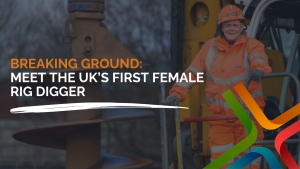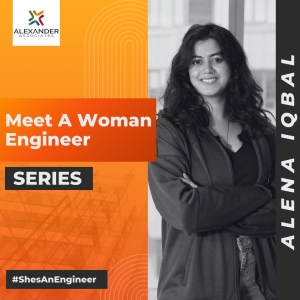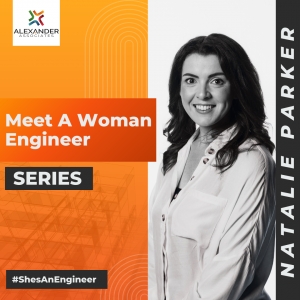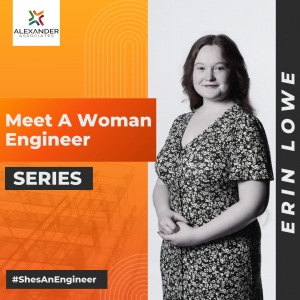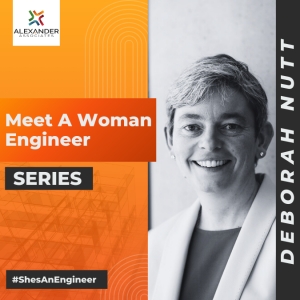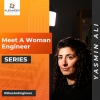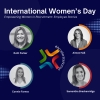Breaking Ground: Meet Natalie Smith, the UK's First Female Rig Digger

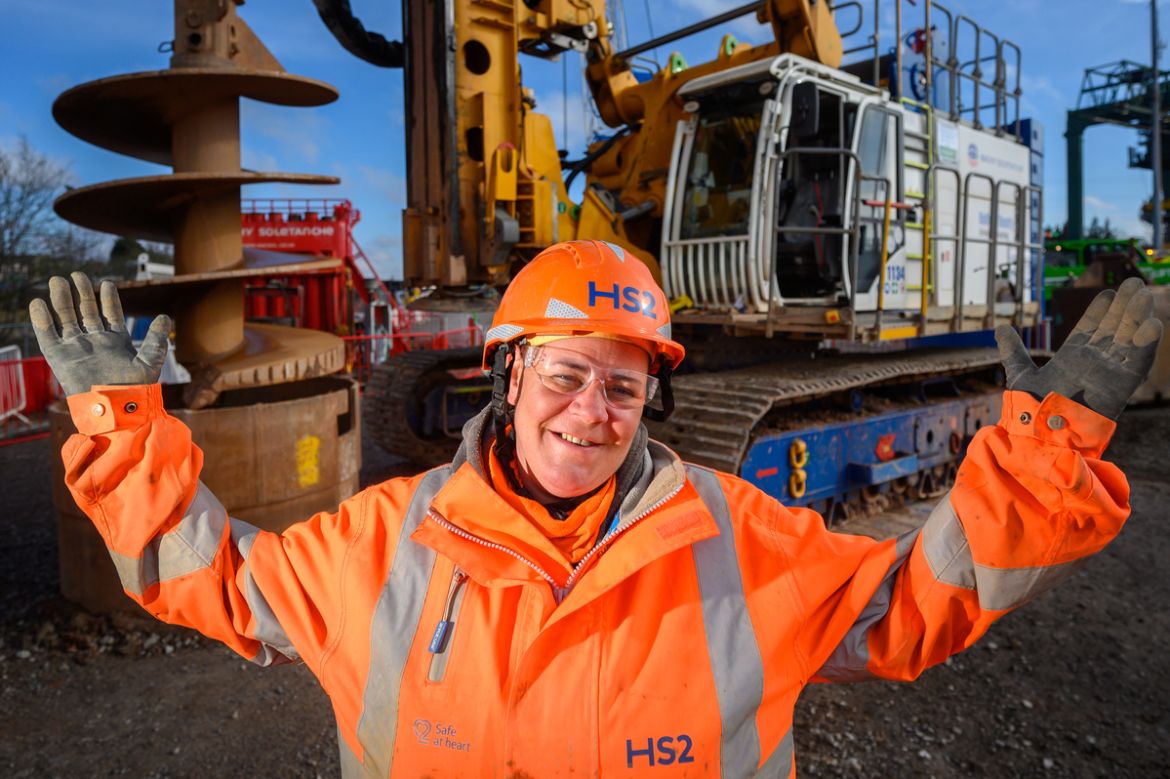
At 44, Natalie Smith is carving out history as the UK's first female rig driver, proving that it’s never too late to pursue a new path. A mother of one and now a proud member of the growing "orange army" helping build Britain’s new railway, Natalie is an inspiring trailblazer in the construction industry.
Now living in Castle Bromwich, Natalie transitioned from her job as a forklift truck driver in warehouse operations after witnessing the HS2 construction near her home. Determined to be part of something bigger, she joined SB3—a joint venture between Bachy Soletanche and Balfour Beatty Ground Engineering. Natalie excelled in their rigorous training program and, in September 2023, earned her Rig Driver accreditation from CITA, officially making her the first woman in the UK to achieve this status.
Leading the Way on HS2
Now five months into her role, Natalie works as part of a 14-person team along the HS2 route in Birmingham, between Saltley and Curzon Street. She currently leads the piling operation for the Duddeston Junction viaduct, a project requiring 110 piles. Despite the immense responsibility, Natalie embraces the challenge, crediting her team's unwavering support for her success.
"Apparently, I’m the first female in the UK to qualify as a Rig Driver, which makes me feel really proud of what I’ve achieved," Natalie shared. "On site, I am the only female in the rig team, but it doesn’t bother me, or the lads—everyone is just so supportive."
Her son is equally proud, often asking her at the end of the day, "How many holes have you dug today, Mum?" And her mother remains in awe of the massive machinery Natalie commands.
Shifting the Landscape for Women in Construction
Natalie’s achievement is even more remarkable against the backdrop of a traditionally male-dominated industry. As of Q3 2024, women made up only 14.7% of the UK construction workforce—about 303,000 women compared to 1.76 million men. In highly specialised roles like rig driving, female representation has historically been almost non-existent.
However, change is underway. HS2 has been a driving force for diversity, with 30% of its Tier 1 supply chain workforce being female in 2022/23—well above the industry average. Additionally, organisations like Balfour Beatty VINCI have launched targeted initiatives, such as a women-only Introduction to Construction course at South and City College in Birmingham, designed to fast-track women into industry roles within 6-8 weeks.
Building a More Inclusive Future
Despite progress, barriers remain. A 2024 report highlighted persistent challenges like inflexible work environments, male-dominated cultures, and a lack of awareness about career opportunities for women in construction. Addressing these issues requires a collective effort:
- Education & Outreach: Schools and industry leaders must promote construction careers to young women, showcasing the diverse roles available.
- Mentorship & Support: Programs pairing female newcomers with experienced mentors can provide guidance and build confidence.
- Inclusive Workplace Policies: Companies must actively cultivate environments where women feel valued, respected, and have equal opportunities for growth.
Natalie Smith’s groundbreaking success exemplifies the limitless potential for women in construction when given the chance. Her story is a beacon of possibility, showing that with determination, support, and opportunity, women can not only participate in but lead the way in shaping the infrastructure of tomorrow.
By continuing to break down barriers and champion diversity, the industry can move toward a future where stories like Natalie’s become the norm rather than the exception.
Sources:
MEET A WOMAN ENGINEER - ALENA IQBAL
Name: Alena Iqbal Meng (Hons)
Job Title: Project Manager – Digital Transformation
Location: Manchester
Alena Iqbal is a Project Manager at Amey. Alena's journey into engineering began at the age of 16 during a work experience at an engineering consultancy. While her peers spent their 1-week work experience photocopying documents, Alena had the opportunity to size a nitric acid tank, which sparked her passion for problem-solving and understanding chemical properties. The supportive and inspiring project manager she worked with played a key role in her decision to pursue engineering, leading her to study Chemical and Process Engineering at the University of Leeds.
Today, Alena thrives in her role, where every day brings new challenges. As a Project Manager she leads digitalisation projects, most recently working on a project to digitalise the planning process of Amey’s construction teams.
As a woman of colour in a traditionally male-dominated field, Alena has faced numerous challenges, yet she has always persevered. A leadership program with Amey helped her overcome imposter syndrome, boosting her confidence and fuelling her advocacy for more women of colour in senior roles within the rail industry. Inspired by the mentorship she received from two female graduates early in her career, Alena is now a passionate mentor herself, dedicated to creating more opportunities for women and paying it forward by coaching and guiding the next generation of engineers.
Today, we explore Alena's journey, as she shares her career path and encourages young girls to pursue their passions in engineering with confidence and without hesitation.
When did you realise that a career in engineering was right for you? Was there a particular moment in your life?
When I was 16, I did a 1-week work experience at an engineering consultancy which inspired me to become an engineer. While my friends spent their 1-week work experience photocopying documents, the PM looking after me had different plans! By the end of the week, I had sized a nitric acid tank. I enjoyed the problem-solving and the learning that came with it, such as calculations and understanding chemical properties. However, it was the team that made this experience truly memorable. I was especially inspired by the PM’s passion for all things engineering, and as a result, I decided to study engineering at university.
What does an average day look like for you?
It varies as I like to get involved in different projects and initiatives. I have weekly catchups with project teams to identify any issues with our digital processes and work towards resolving these. For processes that need fine tuning, I have a detail-oriented approach. The overarching theme is collaborative problem solving as I rely heavily on the expertise of some incredibly talented individuals. I’ve recently worked on a project to digitalise the planning process our construction teams use which has been challenging yet rewarding.
How did you get into this career? What qualifications did you get?
I was looking for a project management graduate scheme and this role seemed like a good fit. Due to the scale of the project and me being on a graduate scheme, I was able to try my hand at several roles which helped me hone in on what I enjoy: Process Optimisation! I graduated from the University of Leeds with a Masters in Chemical and Process engineering (MEng) which has been handy when working on processes in rail!
Did you face any challenges with your career decision as a woman engineer?
I’m a big believer in “If you can see her, you can be her” and I very much did not “see her” when I started, especially in senior roles. Initially, I felt like I didn’t belong in any room I walked into, and I’m sure this reflected in my behaviour as I questioned “Am I supposed to be here?”.
I completed a leadership programme with Amey specifically aimed at individuals from multicultural backgrounds. This programme, along with the mentoring l received, empowered me and helped me overcome my doubts. The rail industry has been championing gender diversity massively which is really promising. However, women of colour are still very much missing, especially in senior management; I’m expecting this to change soon.
What advice would you give to young girls considering a career in engineering?
Pursue your interests to the ends of the earth, whatever they may be. Don’t let society dictate where you do or don’t belong, and don’t self-reject! Operating from a place of abundance will yield far greater results than operating from a place of scarcity - build each other up. This mindset has greatly helped me in my career; where others have seen obstacles, I’ve seen opportunities.
Do you have any standout memories from your career as an engineer?
I do! During my 1-week work experience (mentioned earlier), two female graduates took me under their wing. I returned to that same engineering consultancy for work placements over the next few summers, and being around these women had a profound impact on me. Their genuine mutual respect and the care they showed me have stayed with me. In male-dominated fields, women can feel like they are fighting for one seat at the table; these women taught me the importance of creating more seats at the table. This experience is a driving force for the coaching and mentoring I do with early career professionals in my own industry. I believe it’s my responsibility to pay it forward.
Curious about our #ShesAnEngineer series? Dive into our video series featuring women who are driving change and breaking down barriers in their field. Discover their inspiring stories here: https://www.alexander-assoc.co.uk/women-in-engineering.
MEET A WOMAN ENGINEER - NATALIE PARKER
Natalie Parker is a Technical Specialist for the Operational Technology Group at Sellafield Ltd. Natalie’s passion for STEM, especially maths and science, led her to explore an apprenticeship in Control Systems, quickly advancing from apprentice to senior engineer. Today, she provides technical advice, supports projects, and manages a team of nine engineers, driving collaboration and innovation across facility teams.
As a finalist for the IET Young Woman Engineer of the Year 2024, Natalie is a strong advocate for young girls in engineering, highlighting the field's vast opportunities. She co-leads Sellafield’s Women in Technology group, working to achieve gender balance, and created the "Get Wired…Get Coding" workshop to inspire primary school students to explore electrical circuits and programming.
Today, we explore her journey and how choosing the non-traditional university route has given her valuable hands-on experience and encourages more STEM students to consider careers in engineering.
When did you realise that a career in engineering was right for you? Was there a particular moment in your life?
I always had a passion for STEM subjects throughout school in particular maths and science. I went to study my A-levels at a time the tuition fees had rose from £3000 and year to £9000. At this moment I realised I didn’t know what I wanted to study at university so started to explore apprenticeships available in the local area and discovered Control Systems which appealed to me. This was the first step into my engineering career.
What does an average day look like for you?
My days are extremely varied. I can be undertaking technical teaching to degree apprentices and acting as their line manager, undertaking assurance activities and investigations, providing technical support to projects and front-line engineering teams, carrying out maintenance improvements within my department, leading on work experience, leading the Women in Technology group.
How did you get into this career?
I began my Control Systems apprenticeship in September 2011. I stumbled across this apprenticeship not really knowing much about control systems but the involvement of maths and problem solving really appealed to me. I then spent the next 7 years developing from an apprentice to a senior control systems engineer. I then spent some time in the project team before entering my current role as a Control Systems Technical Specialist.
What qualifications have you earned?
I obtained a 1st class honour in Plant Engineering (Engineering Systems).
Did you face any challenges with your career decision as a woman engineer?
When I had my children who are now 4 and 5, I suffered a bit of negativity with regards to my career and the unconscious bias of individuals. However, I have used this to my advantage and motivation to upskill management and this has given me the tools to progress in my career.
What advice would you give to young girls considering a career in engineering?
The world of engineering is so vast, and the opportunities are endless. As an engineer you can work all over the world in many different industries. It’s an exciting and ever-changing field to work in.
Do you have any interesting stories from your career as an engineer?
During my 7 years as a front-line engineer, I was involved in a very complex system modification due to problems with the facility equipment. The result from the modification enabled the facility to finish reprocessing nuclear fuel and I was able to sit with the operations team and watch the final shear. Very proud moment!
I have also loved running work experience and welcoming some of the students back as our control systems degree apprentices.
Curious about our #ShesAnEngineer series? Dive into our video series featuring women who are driving change and breaking down barriers in this male-dominated field. Discover their inspiring stories here: https://www.alexander-assoc.co.uk/women-in-engineering.
MEET A WOMAN ENGINEER - ERIN LOWE
Erin is a third-year Electrical Engineering Apprentice at Mazak, where she specialises in the CV5-500 machine line. From a young age, Erin knew that engineering was her true calling. While other kids were into trends and toys, Erin found herself captivated by model kits, electrical circuits, and carpentry classes. She asked for tools, not make-up, and found joy in building and problem-solving. Her passion for hands-on work and engineering talent were evident early on—she won first place in the national ‘Who Wants to Be an Engineer?’ competition while still in Year 11.
Fast forward to today, and Erin is flourishing in her apprenticeship, handling electrical assembly, calibration, and safety checks on complex machines, while also contributing to local charity initiatives, raising nearly £2,000 over the past year. As an apprentice ambassador, she champions STEM, participating in career fairs and hosting factory tours. Recently named a finalist for IET Young Woman Engineer of the Year 2024, Erin is inspiring the next generation of engineers.
Today, we explore her journey and how choosing the non-traditional university route has allowed her to gain valuable hands-on experience.
When did you realise that a career in engineering was right for you? Was there a particular moment in your life?
I have long known that I wanted to follow in my grandfather’s footsteps into a career in engineering. As a child I loved model and electrical circuit building kits. I asked for tool kits and a soldering iron whilst friends were asking for clothes and make-up, and I went to carpentry classes whilst others played sports. During year 11, I even won first place after entering the national competition ‘Who wants to be an engineer?’. Therefore, the question for me was never about what I wanted to study, but how.
What does an average day look like for you?
As an electrical apprentice at Mazak, I spend my day-to-day work life out on the factory floor. Now that I am in my third year, I am just working in one area, the CV5-500 machine line. My job is to electrically assemble and adjust the machine so that it works correctly and is safe to operate. I am also still working towards my qualification, so I spend a couple of hours each week working on written work, and I hope to finish my apprenticeship by August.
As an active member of our apprentice charity committee, I assist with the organisation and running of all our projects. Over the last year we have runover a dozen successful events, raising almost £2,000 in total in aid of various local charities.
Part of being a Mazak apprentice is being an apprentice ambassador. I believe that STEM outreach events are so beneficial to the community because they help young people know what they want to do as their career. However, they are also beneficial to my own personal growth as I am naturally a very shy person, and they have helped me leave my comfort zone. Through Mazak, I have had the opportunity to attend numerous career fairs, give many presentations, and many in-house events too (mostly factory tours). This year, I helped with at least 1 event every fortnight.
How did you get into this career? What qualifications did you get?
Whilst in Year 10, a local engineering company contacted my school to offer a small number of cadetship placements. I immediately submitted my application and was lucky enough to be selected onto the programme where I received firsthand experience of what it would be like to be one of their employees. I found being totally immersed into the world of work totally mind blowing. Exchanging one uniform for another, the sense of pride I experienced in my new, albeit temporary, role was totally unexpected. My new colleagues treated me with respect and willingly demonstrated their skills. When the time came, I left saddened but hopeful that one day I would be given an opportunity to return.
After completing my exams, as a very able student leaving school, I could have easily opted to follow my peers along the well-travelled route through a university degree. However, as I have always found practical learning opportunities to be more enjoyable, engaging and beneficial, the apprenticeship route seemed much more suited to my preferred learning style and therefore so much more appealing. Additionally, my awareness that many graduates leave university with no guarantee of work in their chosen field and huge student debts, was also influential in my decision-making process. It made financial sense to me to earn a wage whilst training alongside experts, guaranteeing my resulting qualifications and experience would be relevant and marketable when my course finished.
Upon discovering that the company I had attended for my cadetship offered a comprehensive and well renowned electrical engineering apprenticeship programme, my mind was made up. I applied, and following an intensely competitive application process, I was successfully offered the role. I am now in my third year and am thrilled about my progress so far. Choosing an apprenticeship has proven to be the best decision that I could have made.
Did you face any challenges with your career decision as a woman engineer?
Going from a school environment where there are many other young women around to an environment where there were hardly any was initially quite daunting. However, Mazak staff made me feel welcome and the workplace didn’t feel so intimidating any more.
What advice would you give to young girls considering a career in engineering?
My first piece of advice would be to talk to your career’s advisors about work experience opportunities, as they can often help you to find companies that you would be well suited to working for in the future. This both gives you relevant workplace experience, but also makes your applications stand out when applying for jobs/apprenticeships. I would also go to as many open events and career fairs that you can, as this well help you find the job that you want to do in the future. Yamazaki Mazak will be holding a woman in engineering event on the 11th of December, where the goal is to get more young women into engineering and is open to everyone.
I would also highly recommend an apprenticeship instead of going down the university path. This means that you can earn whilst you earn, gain relevant industry experience, meet likeminded people, and get a head start into your career. If this is something that sounds appealing, an apprenticeship would be perfect for you. One thing to remember is to apply earlier rather than later, as lots of companies will close their job adverts once they have enough applicants. Another thing to consider is not only applying directly to a company, use a service that will help you find the right apprenticeship for you. For example, Hereford and Worcestershire Group Training Association will send your CV to as many companies as they can and will help prepare you for life as an apprentice.
Do you have any standout memories from your career as an engineer?
My company, Yamazaki Mazak UK ltd, holds an open house every year for existing and potential customers and they all receive a factory tour during their visit. It is apprentices that give these tours. It was one of my last tours of the week, having given around 7 by this point, I was then given a small group of 3 people, an engineer, his daughter, and an apprentice. This was one of my most enjoyable tours and it ended up taking over 2 hours, instead of the usual 1.5 hours, because they were so keen and asking so many questions about Mazak and my experience as an apprentice.
In April, I was given the opportunity to represent my company at the MACH show in Birmingham and give tours to schools that were visiting. As I was conducting one of these tours, I heard my name being shouted from across the hall and I looked around but didn’t see someone from my company. Instead, I saw the people that I toured around Mazak during the open house. I felt honoured that they remembered me from an event many months ago, but that they also wanted to reconnect. Thank you to Metal Seagulls Ltd for this experience.
Curious about our #ShesAnEngineer series? Dive into our video series featuring women who are driving change and breaking down barriers in this male-dominated field. Discover their inspiring stories here: https://www.alexander-assoc.co.uk/women-in-engineering.
MEET A WOMAN ENGINEER - DEBORAH NUTT
Deborah is a Senior Director at Arcadis, based in London, with a distinguished career in civil engineering that began after an early passion for constructing things and a pivotal moment at a summer engineering course at Salford University in 1991.
Over the course of her career, Deborah has contributed to high-profile projects like flood defence schemes along the Thames Estuary and the innovative Medmerry Managed Realignment, which transformed the British coastline.
After earning a 2:1 in Civil Engineering and becoming a Chartered Engineer in 2002, she quickly advanced in her career, benefiting from a supportive family and educational environment. Now serving as an NEC Project Manager, she oversees complex projects, where every day brings new challenges and opportunities.
A strong advocate for diversity in engineering, Deborah encourages young girls to pursue careers in the built environment, highlighting the chance to make a meaningful impact.
Today, we dive into her story, exploring the experiences and lessons that have driven her success and shaped her journey.
When did you realise that a career in engineering was right for you? Was there a particular moment in your life?
As a kid I had always liked toys like Lego, Meccano or making dens in the garden …oh and obviously mud pies! So clearly from an early age I liked to construct things and enjoyed the outdoors! I opted for science and maths at A level as I thought that would get me further rather than what I was good at, Music, French and Humanities!
The teacher I babysat suggested engineering as she said, “I could see you as a civil engineer” and I had no idea what that was. I was lucky enough to attend an INSIGHT For Girls course at Salford University in the summer of 1991 that explored all forms of engineering, and it was here I decided that civil engineering was a career I’d be interested in, so I guess it was on that course that defined my career choice!
What does an average day look like for you?
My days are very varied, my current role is as an NEC Project Manager administering contracts for the Environment Agency delivering flood defence schemes across the Thames Estuary. My day can involve visits to site to monitor progress and resolve issues, meetings in offices with team members, engaging and talking to clients, assessing change on my projects and reviewing programmes. It’s rarely the same!
How did you get into this career?
I applied to various universities and was accepted back to Salford University to study Civil Engineering with an Industrial Year, and I was fortunate enough to be successful at my second year interview and gained a place at Costain for my year out. Here I was able to build on my theoretical knowledge as well as getting a good understanding of what life was like as a site engineer!
What qualifications did you get?
I got 4 A Levels (just) in Maths, Physics, Chemistry and General Studies. I then went to university and gained a 2:1 in Civil Engineering and then in 2002 I became a Chartered Civil Engineer.
Did you face any challenges with your career decision as a woman engineer?
I was fortunate as I didn’t. My parents were very supportive, and my teachers encouraged me.
What advice would you give to young girls considering a career in engineering?
If you have a passion for the built environment, then do it.
If you want to make a difference, then do it.
If you want to improve the quality of life, then do it.
Basically no one should be stopping you from doing it. It’s a varied and interesting career and can take you anywhere in the world if you want it to. It’s not a “dirty” career as was once thought and construction companies are actively seeking diversity in their workforce and as such the working conditions have improved vastly since I started my career!
Do you have any standout memories from your career as an engineer?
Not sure if it’s a funny story but when I started back at Costain after my career I learnt a valuable lesson about record keeping. In a road construction you have to clearly mark out where things like drainage gullies and draw pits are. I made a mistake and couldn’t find one in a footpath before it was to be tarmacked…so I was given a shovel and a pick axe and told to “find it”…I did…but I didn’t overlook a measurement again!
The project I am most proud of is Medmerry Managed Realignment as this was innovative and unique. It was a flood defence scheme that involved a 7km embankment in land from the beach between Selsey and Bracklesham with the aim was to provide not only flood defence but also a variety of habitats. We did this through a 110m breach (create a gap) in the shingle beach and allowed the sea in to create the variety of habitats. You can see this realigned coastline from the air and it's changed the shape of the British coast line for ever…that’s something to be proud of!
Curious about our #ShesAnEngineer series? Dive into our video series featuring women who are driving change and breaking down barriers in this male-dominated field. Discover their inspiring stories here: https://www.alexander-assoc.co.uk/women-in-engineering.
Titi Oliyide:
Meet a Woman Engineer - Titi Oliyide
Job Title: Senior Process Safety Engineer
Location: Manchester/London
When did you realise that a career in engineering was right for you? Was there a particular moment in your life?
I became interested in engineering from a young age. As a child, I always asked a lot of questions about why things worked the way they did. One of the things I found fascinating was the cooking process of converting raw ingredients into delicious food.
My fascination and curiosity were encouraged by my very supportive parents and siblings. In school, I also thoroughly enjoyed the logical lessons in maths and physics. Based on my interests and discussions with family and friends, I decided to study chemical engineering at university.
What does an average day look like for you?
No two days are the same! I get involved in a range of activities such as leading hazard identification workshops with a team of engineers from different disciplines, brainstorming potential solutions to mitigate/eliminate hazardous scenarios with my colleagues, or analysing engineering documents to carry out risk assessments or design reviews for safety.
I work in a company that is developing a pioneering electrolyser technology, so there are different challenges to solve on a daily basis! As a safety engineer, it is also important that I have a good overview of the engineering process/system, so I can identify what could go wrong and put measures in place to eliminate/reduce the risk of hazardous scenarios.
Some days, I get invitations to speak to the younger generation to consider STEM careers – I thoroughly enjoy the opportunities to share my excitement about engineering and my engineering career so far.
How did you get into this career? What qualifications did you get?
I studied to obtain a Bachelor’s degree at University of Lagos, Nigeria in Chemical Engineering. Afterwards, I moved to the UK to complete my Master’s degree in advanced chemical engineering (Process Systems specialisation) from Imperial College London.
My journey into process safety engineering began at my first role after my master’s degree, where I worked on safety, risk and reliability assessments for oil and gas facilities. I’ve also achieved professional registration as a Chartered Engineer in September 2022.
Did you face any challenges with your career decision as a woman engineer?
One of the challenges is the misconception is that women are not suited for some (or any!) areas of engineering. This is mainly due to the depiction of engineering in the media. Usually, the first thing that comes to mind when we think of engineering is hard hats and greasy overalls.
While this is part of engineering, other engineering areas exist. This is why I am passionate about demystifying the engineering profession. Engineering is generally about solving societal challenges. As women make up roughly half of the human population, we should be adequately represented in the solutions to these challenges.
What advice would you give to young girls considering a career in engineering?
Boldly explore new opportunities and challenge the status quo. Engineering is a great way to contribute to solving global challenges working with other skilled people in the industry. Despite the prevailing stereotypes, there is no one way an engineer should look like. Seize every opportunity to contribute your unique skills to solving challenges we face in the world today.
Do you have any standout memories/funny/interesting stories from your career as an engineer?
I have quite a few! However, the one that stands out would be the opportunity to ride in a helicopter to an offshore oil and gas facility in the middle of the Atlantic Ocean. This was my first opportunity to see, in real life, various equipment which I had only previously encountered in drawings or videos.
Additional Info
- Episode TitleTiti Oliyide

